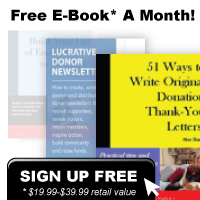Have you ever heard the idea in direct marketing copy-writing that you should ‘write to responders’?
I tried googling ‘write to responders’ and ‘writing to responders’ but got no relevant results, which is surprising considering the importance of this notion.
The idea of writing to responders is a nugget of advice I was given many years ago by a true wizard in direct mail. He told me that when writing copy for response, I should not write to everyone in the audience but rather I should write to responders.
So what does it mean to write to responders?
It means you should write your copy for those in your audience who have a propensity to respond. Your copy should not try to convince everyone in your audience. It should be aimed at those most likely to respond.
Before we look at how to do this, let’s first consider why you should do this because you may rightly be thinking: “Why not try to convince everyone?” The answer is very simple. It’s because the printed word – direct mail or any kind of direct response copy – has a limited power to persuade.
Let’s take an example.
Let’s say you want to solicit support for a political party. If you could speak to your prospects in person or even over the phone, you could be forceful and control the conversation. You could deal with objections and use your personal charisma. And you might be able to change a few minds and persuade some people from other parties to switch. But you can’t do that with direct mail copy. You can’t deal with objections. You can’t use your charisma. In fact you can’t even be sure that anyone will even read your copy.
People will only read your message if they want to. And they will want to only if they have an interest in your message. In just about any audience, there will be many who will be indifferent or even hostile to your message and copy will not do well at turning these people around.
The bottom line – written copy doesn’t have the persuasive power to change minds.
But it does have the power to tickle the interest that is already there. If there’s a tiny spark, copy can kindle it into a flame. Back to the political fundraising example. Copy is great for getting people who are already members or supporters to continue their support but would not do well at getting people to switch parties. In short, the best use of DM copy is to preach to the converted.
So how do you ensure that you are preaching to the converted? Just make sure that you choose the right lists. The better the list, the stronger the predisposition to your offer. With the right list, you don’t so much have to create interest as to arouse and capitalize on the latent interest that is already there. As in all direct mail, the list is the most important determinant of response.
There are several ways to aim your efforts at those who might have a propensity to respond.
For one thing, you have to get to the point early in your copy. Your message is competing with many other messages. Plus people don’t have time to waste. If you believe your audience will want to know about your mesage, don’t hide it. Put a strong statement on the envelope or in the headline. This will allow people to quickly recognize: “This is something I’m interested in. I should read this”.
Another way to write to responders is to take a more assumptive attitude. Use a more forceful tone in your copy as opposed to less forceful. Some copywriters take a lowest common denominator approach and weaken their copy down for all readers.
And another example of writing to responders is to use long copy.
If you want everyone to read your copy you could write very short copy. You will get higher readership but less response. The length of copy – why long copy usually works best – is the subject a future newsletter. For now, please accept the notion that long copy works better. It will get less readership but higher response.
So quick recap:
For best response get to the point quickly, be forceful in your tone, don’t be afraid of longer copy and last and most important, use the right lists.




